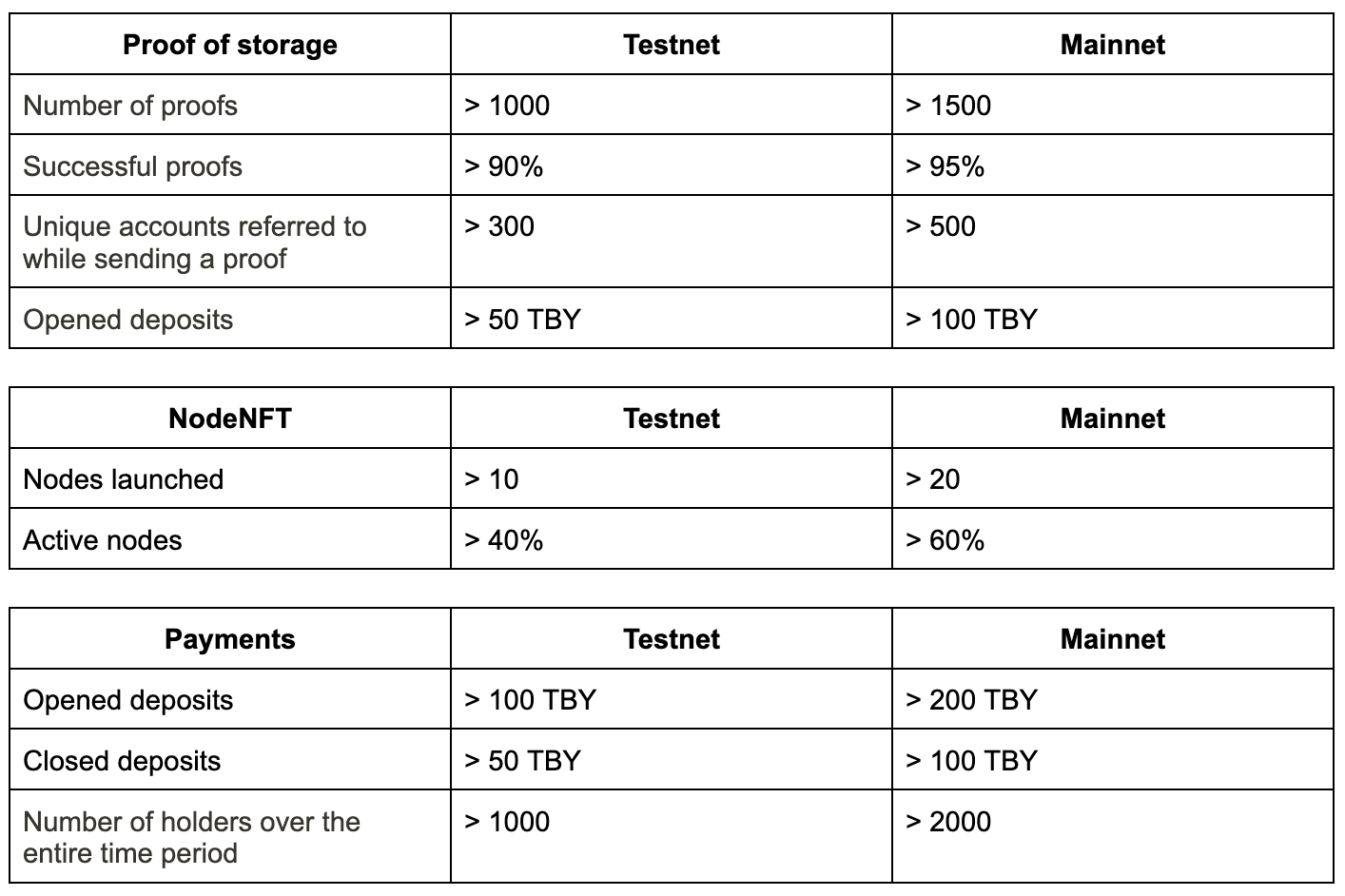DeNet Storage Protocol
DeNet is a unique, self-contained DePIN storage protocol. Launched in 2017, DeNet offers an opportunity to utilize spare storage capacities all over the globe eliminating the need for centralized data centers. By leveraging blockchain technology, smart contracts and the core principles of Web3, the DeNet Storage Protocol offers a mutually beneficial solution for all network participants, restoring the data ownership for users.

About Protocol
Problems solved by the protocol
DeNet Storage Protocol aims to address the worldwide data storage problems, including specific issues related to Web3 storage:
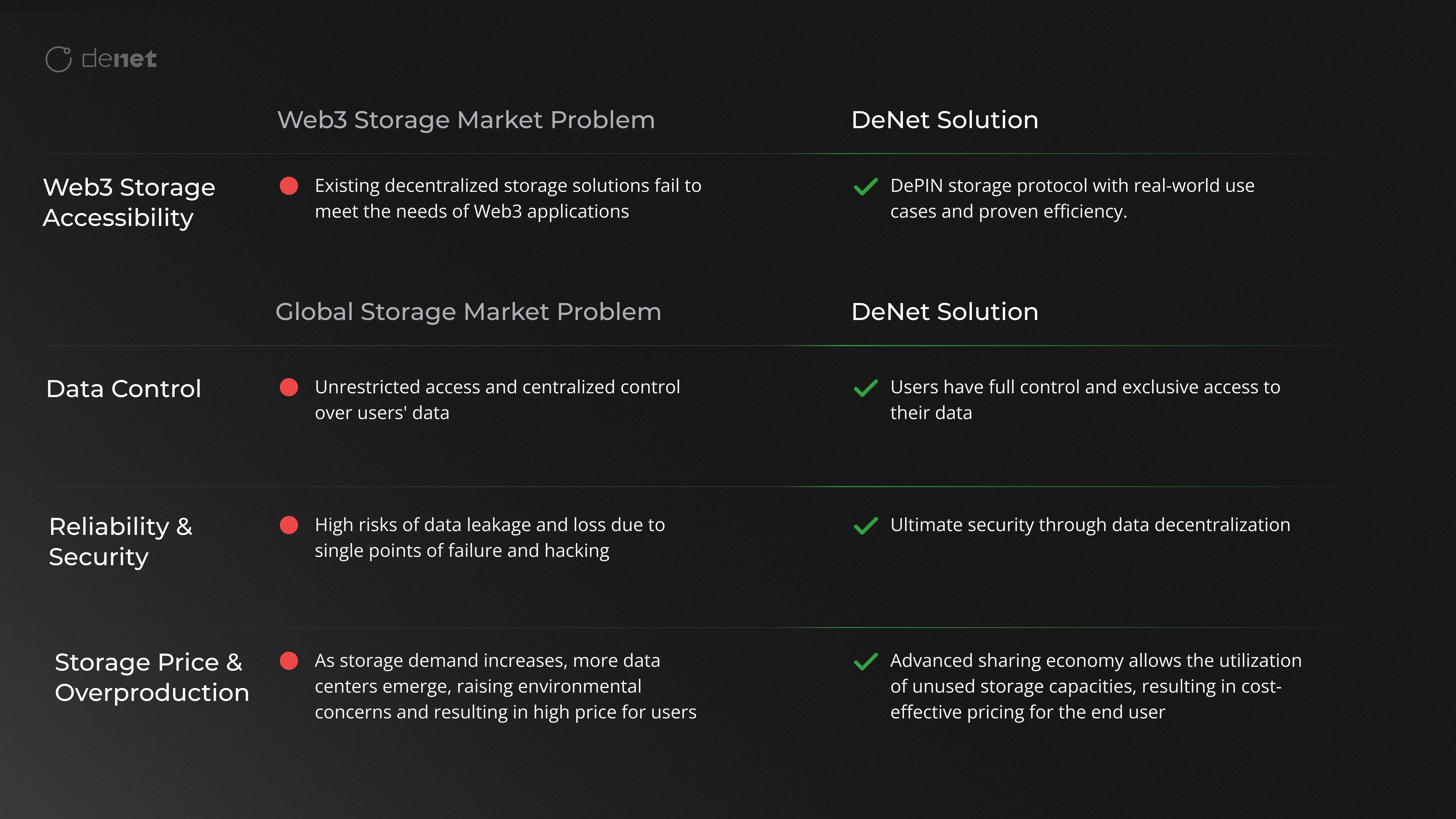
Features
- Multichain – the ability to run on any blockchain;
- Storage tokenization with self-stabilizing price;
- Automatic maintenance of file replications;
- Absolute data privacy with client-side encryption;
- Non-custodial data storage with full decentralization and no single point of failure;
- Low hardware requirements for Datakeepers (Node runners).
How it Works
Uploading
- Each file is divided into 1 MB chunks.
- Each chunk is client-side encrypted with a private key.
- Chunks are uploaded to the node and replicated to other nodes instantly.
- Once the replication is confirmed, the file is considered to be uploaded.
Storing
- Data is stored on multiple nodes, and the number of copies can be configured by the user.
- The nodes monitor the quantity of copies for each chunk continuously, and if there are not enough of them, the chunk is replicated to another node to restore the necessary amount. The mechanism is called Autoreplication.
Proof-of-Storage and Payments
- A Datakeeper (node) consistently generates proofs of data storage based on the Merkle Tree structure and the latest hashes in the blockchain.
- Upon successful proof, TBY tokens are automatically debited from the user’s balance and sent to the Datakeeper.
Retrieving
- Multiple 1 MB chunks are downloaded simultaneously from different nodes, which greatly speeds up data retrieval.
Use cases
The DeNet Storage Protocol offers several use cases:
1. Store data:
Individuals or organizations can utilize the DeNet Storage Protocol to securely store various types of data. This can range from personal files such as documents and media to business-critical data like databases and backups. Here are a few examples of the types of data that can be stored securely using the DeNet Storage Protocol:
- IoT (DePIN) data storage
- AI data storage
- Sensetive data storage
- Media storage (video, photo, audio)
- Documents and file storage
- Backups and recovery storage
- Academic research data storage
- Big Data storage
- Healthcare data storage
- Financial data storage
- Social media and messaging data storage
2. Provide storage:
- Monetize the unused capacity of your devices and earn;
- Maximize your earnings by building a network of storage farms.
Built-on services
There are several services built on the DeNet Storage Protocol with a high competitiveness in both Web2 and Web3 markets: DeNet Storage mobile app, DeNet Node, DeNet Market, DeNet Desk. Anyone can utilize the protocol to create a new service.
.png)
DeNet Storage
DeNet Storage is the largest decentralized storage app. DeNet Storage combines the ease of traditional cloud storage services with the privacy and security of blockchain technology. Available for iOS and Android. Desktop version is currently under development.
Features
- Privacy
Uploaded files are split into one megabyte blocks and client side encrypted using the user’s key, so only the user can decrypt their data. The blocks are distributed across multiple nodes worldwide. But even a node can’t view the stored data.
- User-friendly
The app has a simple interface, friendly to both crypto-native and non-crypto-native users.
- Seamless payments
DeNet Storage provides the easiest fiat and crypto payments available on the Web3 market.
Use cases:
- Sensitive data storage;
- Personal media storage;
- Documents and file storage;
- Automatic backup of gallery;
- Private file sharing.
.png)
Datakeeper Node
A Datakeeper is a node in the DeNet network, providing storage space to users as part of the DePIN initiative.
DeNet Storage Protocol enables direct access to storage space from Datakeepers, eliminating intermediaries. Users pay for storage, supporting the network, while Datakeepers are incentivized.
How it works:
- To launch the node, you have to purchase a node during the Node Sale;
- Datakeepers share their storage space and earn rewards for storing users’ data;
- Files uploaded by users are replicated across multiple Datakeepers; each file is encrypted for privacy;
- Proof-of-Storage algorithm verifies stored fragments, enabling payment transactions.
Benefits of being a Datakeeper:
- Accessibility for all: minimal technical requirements and optimized energy consumption;
- No intermediaries: fair interactions among Datakeepers, users, and developers;
- Environmental impact: Proof-of-Storage promotes eco-friendly mining by reusing unused space;
- Contribution to the development of DePIN and opportunity to join at early stage;
- Beneficial conditions: Datakeepers have 2 main sources of income – tokenomics share and payment for data storage.
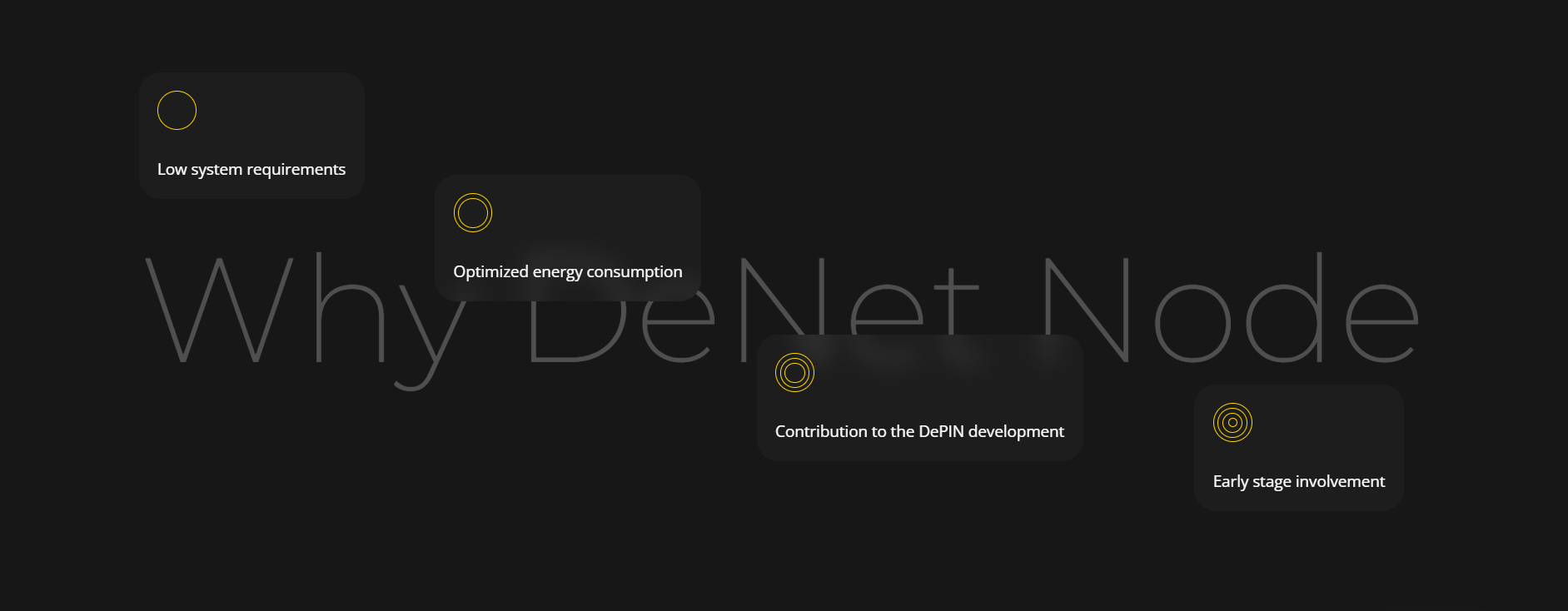
Watcher Node
“Watcher” is a mobile device node, designed to enhance the security of a decentralized storage network like never before. Anyone with a smartphone can turn on Watcher Node in the DeNet Storage app and earn, while checking every piece of data on the storage network for the highest level of security.
Lern more and become a Watcher Node
How to Become a Watcher Node
The process is remarkably simple:
- Download the DeNet Storage app on your smartphone (iOS and Android compatible).
- Turn on the Watcher Node with a single tap.
- Check file parts on the network and earn.
From that moment forward, your phone will work in the background, periodically checking for sufficient copies of file parts stored on the DeNet network. If any file part has fewer copies, your Watcher Node automatically alerts the Datakeepers network to generate more replications.
The Benefits of Your Contribution
By actively participating in the network, users earn $WN for every file part they check. The more files the Watcher Node processes, the greater potential earnings. Earning $WN also determines the eligibility for the upcoming DeNet token and Datakeeper node airdrop on the peaq network.
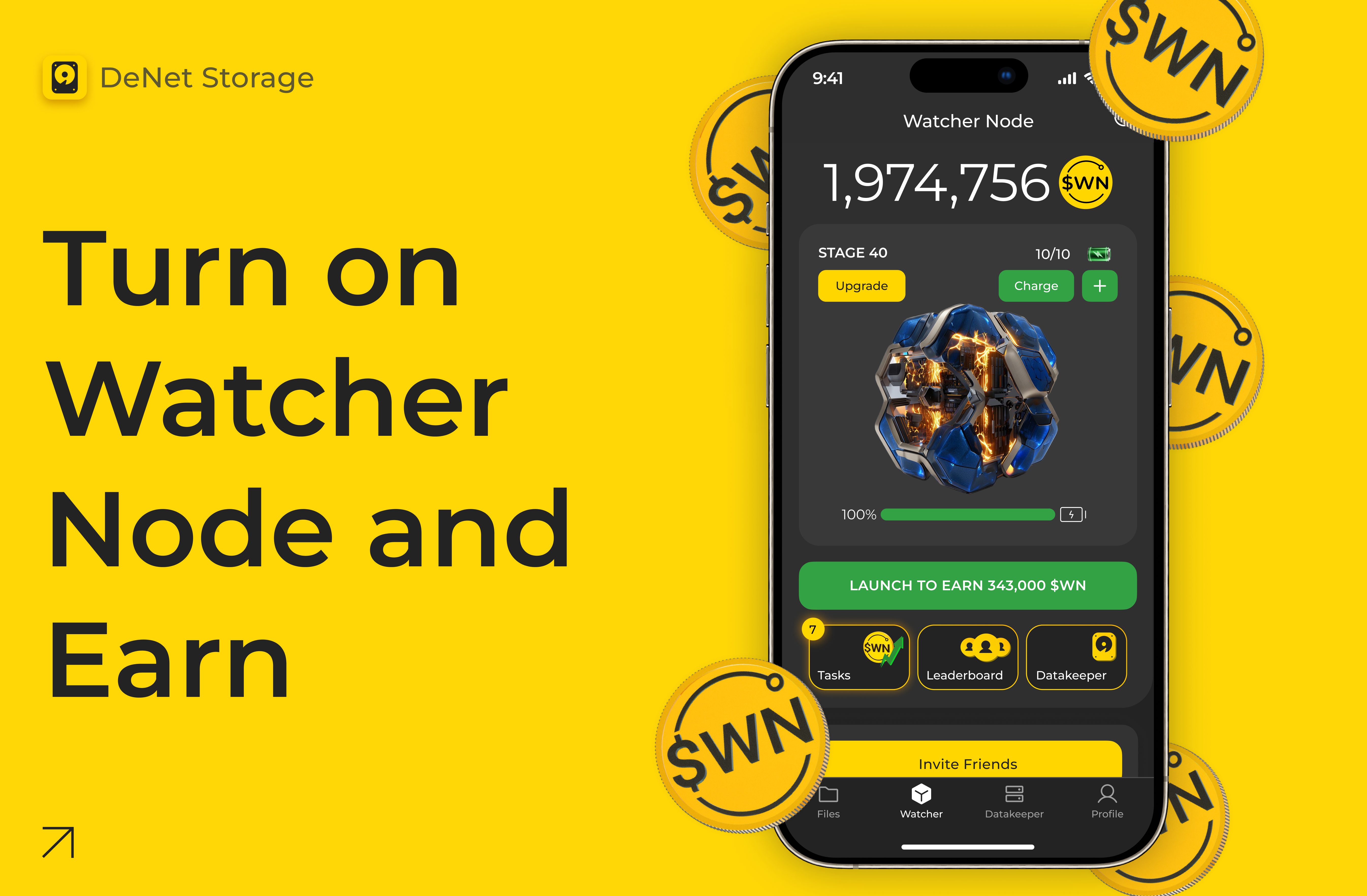
Enterprise solution
With a track record of proven efficiency in the B2C market, DeNet offers a decentralized and private storage solution tailored specifically for businesses. This solution enables businesses to securely store and manage their data, offering benefits such as improved data security, reduced costs, and user-friendly data management.
Who is this for:
- DePIN projects
- AI-based projects
- GameFi
- SocialFi
- NFT Marketplaces
- Decentralized Identity Solutions
- Decentralized Autonomous Organizations (DAOs)
- Decentralized Finance (DeFi) Platforms
DeNet B2B storage to be released soon. Contact us to discuss your business storage needs
Build on top of the protocol
By building on top of the protocol, you can harness the benefits of decentralized storage, such as data privacy, security, and availability. It also enables the creation of applications that are resistant to censorship and single points of failure.
- Enhance your product with a decentralized storage layer;
- Build your own innovative solution by leveraging the DeNet Storage Protocol.

DeNet SDK
DeNet SDK provides tools and resources for developers to integrate decentralized storage and computing capabilities into their applications. It allows developers to leverage DeNet Storage Protocol to store and process data in a decentralized, secure, and efficient manner.
To be released soon. Contact us
Roadmap
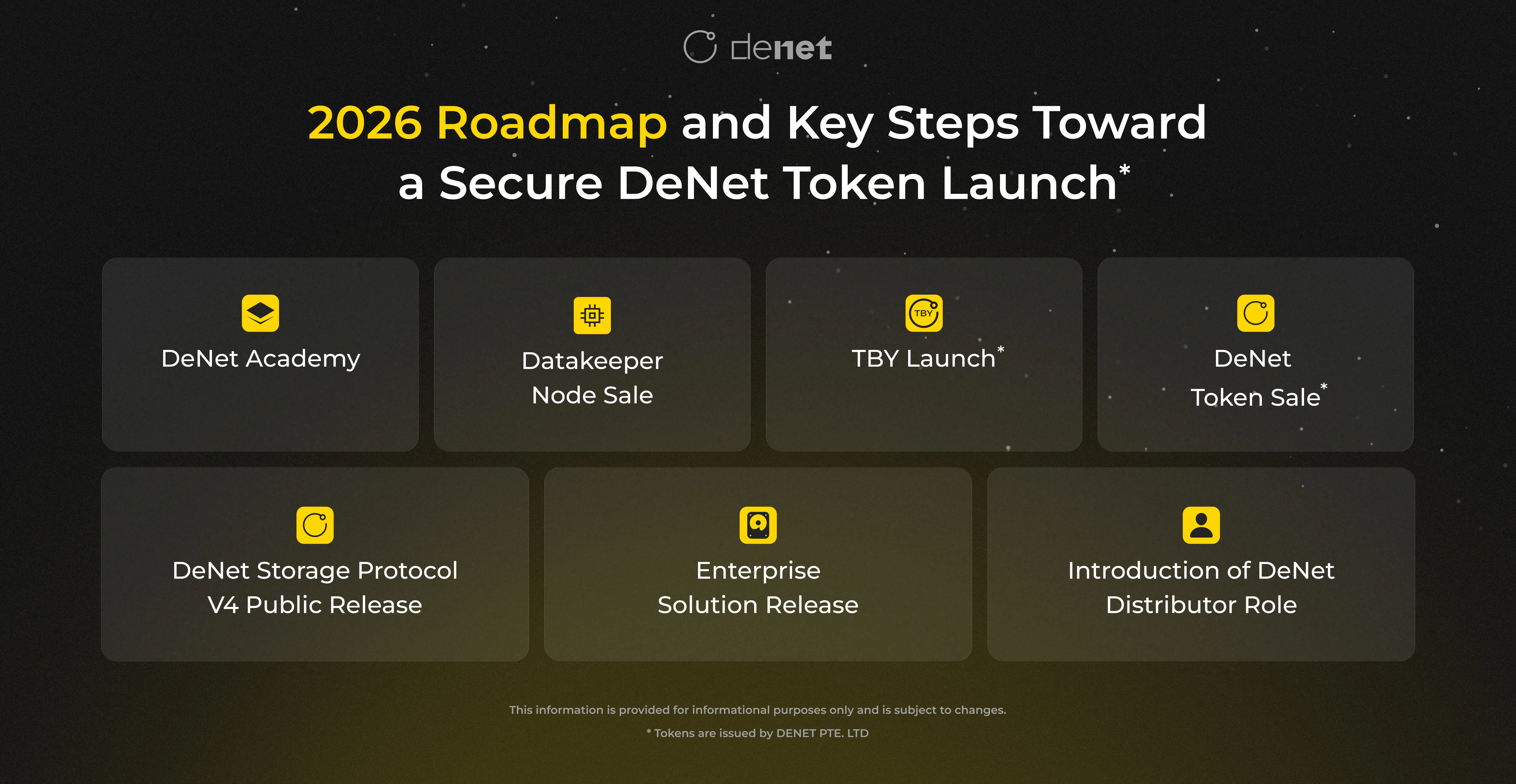
Tokenomics (DeNet Storage Protocol v4)
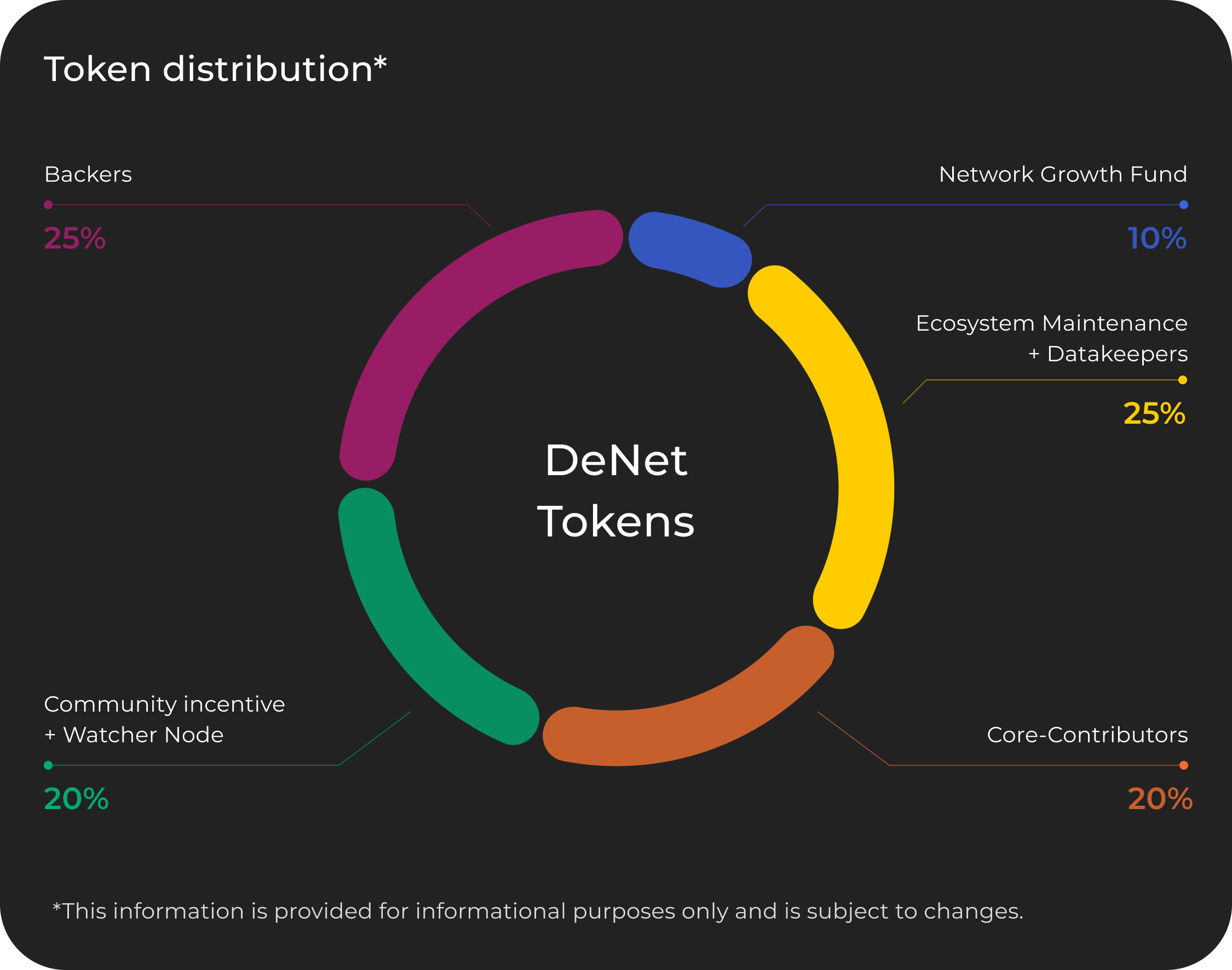
DeNet Storage Protocol v3
DeNet Storage Protocol v3, launched on the Polygon network as a testnet, represents the third iteration of the protocol. Storage Protocol v3 introduced significant innovations to the decentralized storage market. Soon, the market will see the launch of the newest and most innovative Storage Protocol v4.
DeNet Storage Protocol v4 represents the pinnacle of decentralized storage technology, designed to deliver sovereign, secure storage solutions for individuals, as well as for the Enterprise and Business-to-Government (B2G) markets. With development in full swing, v4 introduces cutting-edge features to enhance scalability and accessibility, including Datakeeper Node Pools. A significant milestone is the upcoming release of the Datakeeper Node Software starter version, scheduled for June 9, 2025, marking a critical step toward redefining decentralized storage.
Tokenomics
DeNet boasts a distinctive dual token tokenomics system that elevates the value of its utility tokens, benefiting the entire DeNet ecosystem.
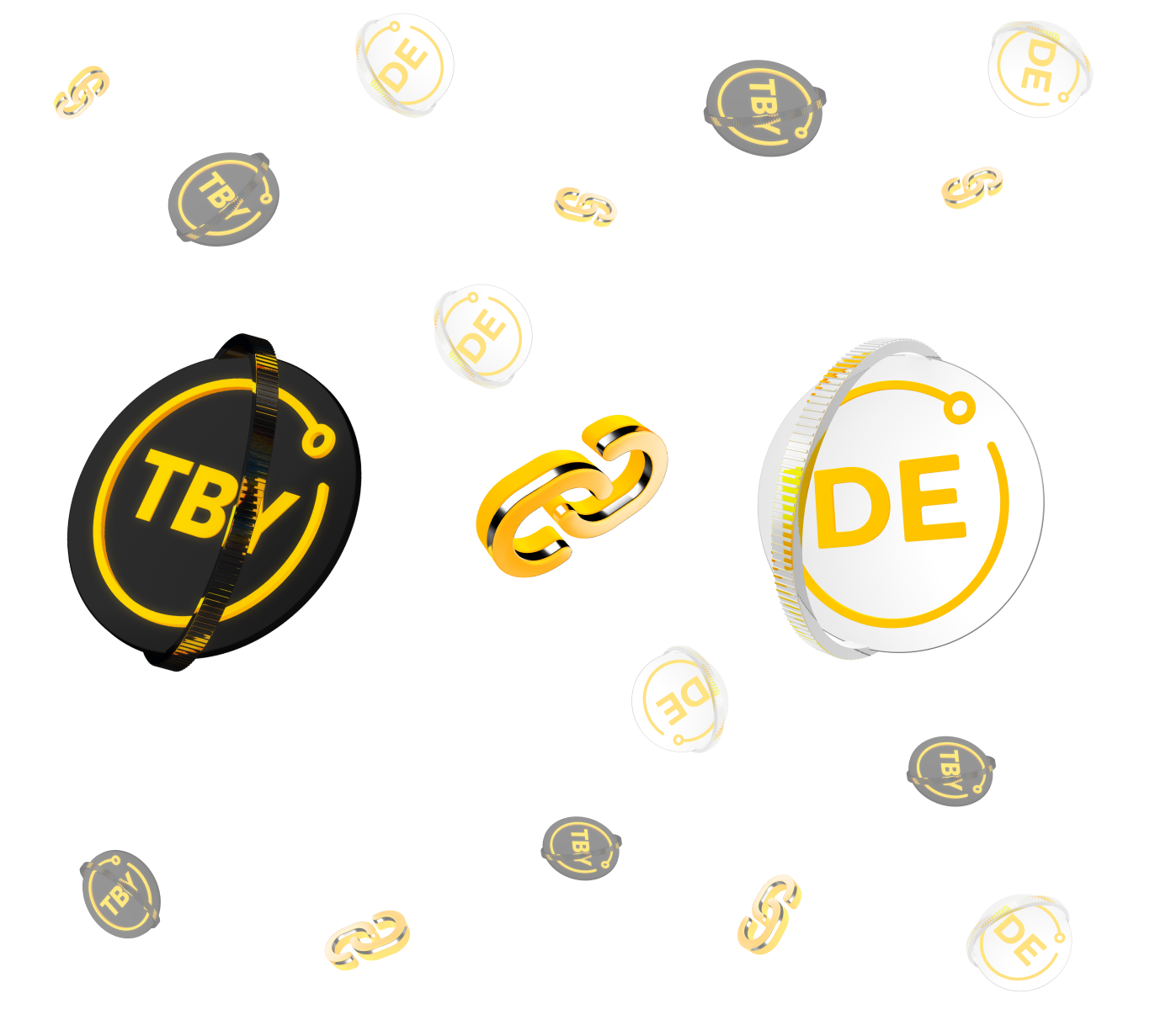
DE Test Token
DE is a governance and deposit token of the DeNet Storage Protocol with a limited supply. The decision for the launch of the DE token on the mainnet was made by the DeNet Consensus members. Link to proposal
The DE token allows to:
-
Issue TBY token to use services based on DeNet Storage Protocol;
-
Manage DeNet Storage Protocol settings;
-
Participate in Consensus voting.
Tokenomics
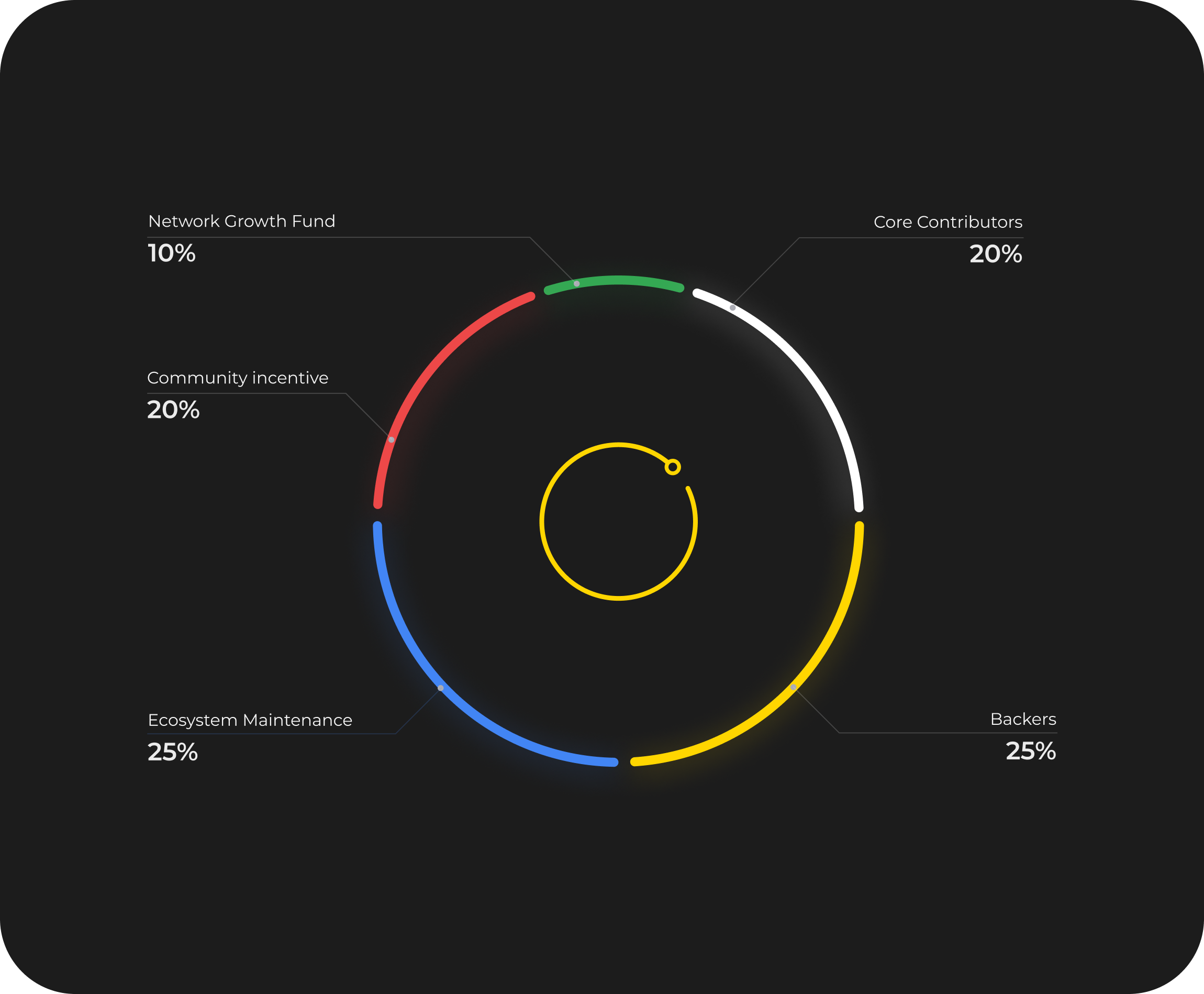
TBY token
TBY, short for Terabyte/Year, is a storage token of the DeNet Storage Protocol. TBY offers real utility in DeNet's storage ecosystem and has unlimited supply.
TBY allows to:
- Automatically pay for storage services via a Proof-of-Storage contract;
- Receive payment for providing storage resources (for Datakeepers);
- Determine with 100% accuracy the amount of purchased storage/traffic without further volatility.
TBY’s value
TBY's value aligns with global storage demand and supply dynamics. By 2030, the volume of stored data will reach a 1300% increase compared to 2020, which will increase the demand for TBY and its price. However, TBY will remain constant in storage capacity (1024GB), but can vary in relation to fiat and cryptocurrencies depending on the demand.
When you open a deposit, the TBY token increases in value, and when you close the deposit, the TBY token falls in price. The rate of price growth and fall is determined by the Consensus through on-chain voting. This ensures the best possible storage price for users and rewards for Datakeepers.
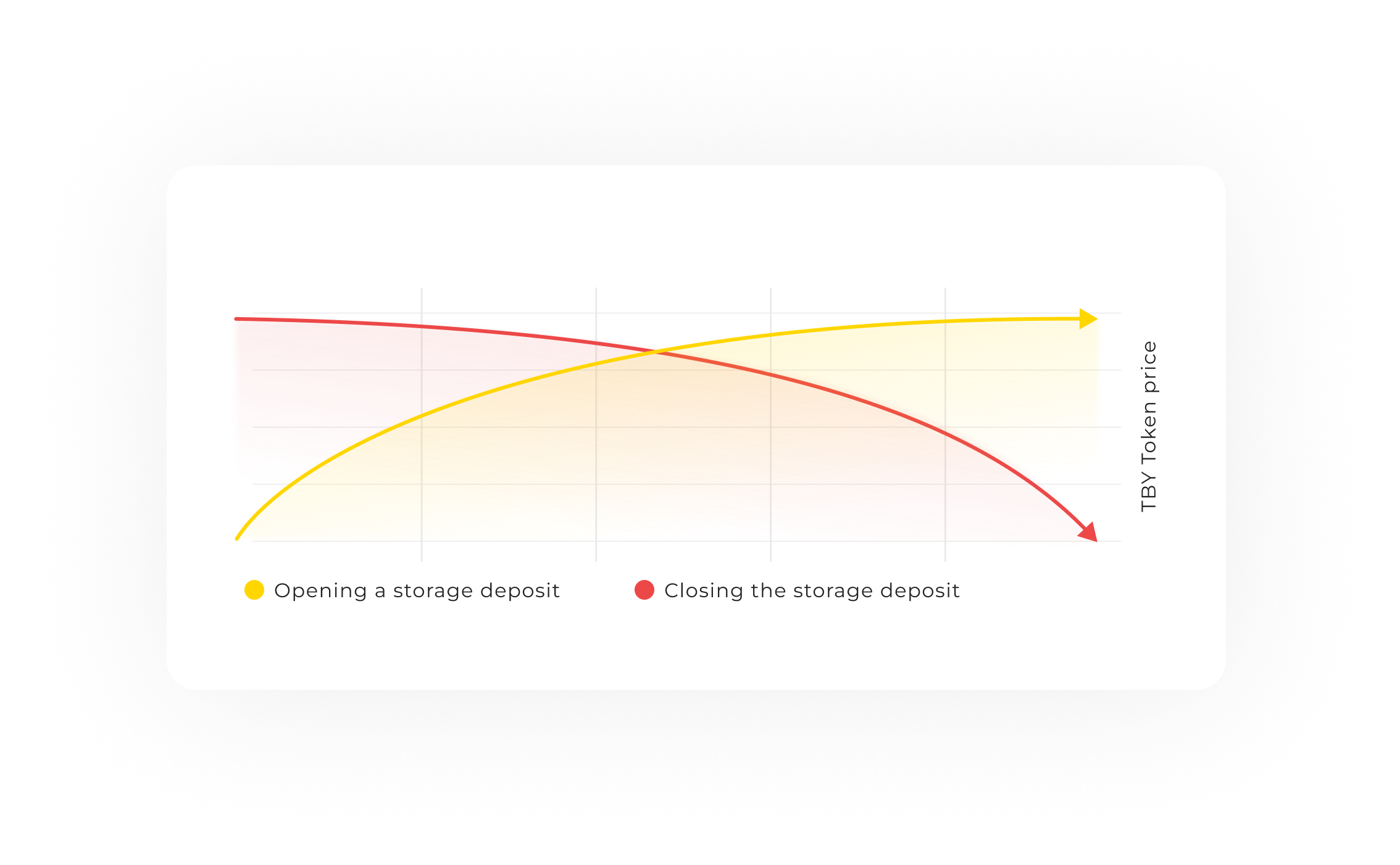
Opening a TBY deposit
Issuing TBY by opening a deposit at a predetermined proportion of DE to TBY according to the scheme:
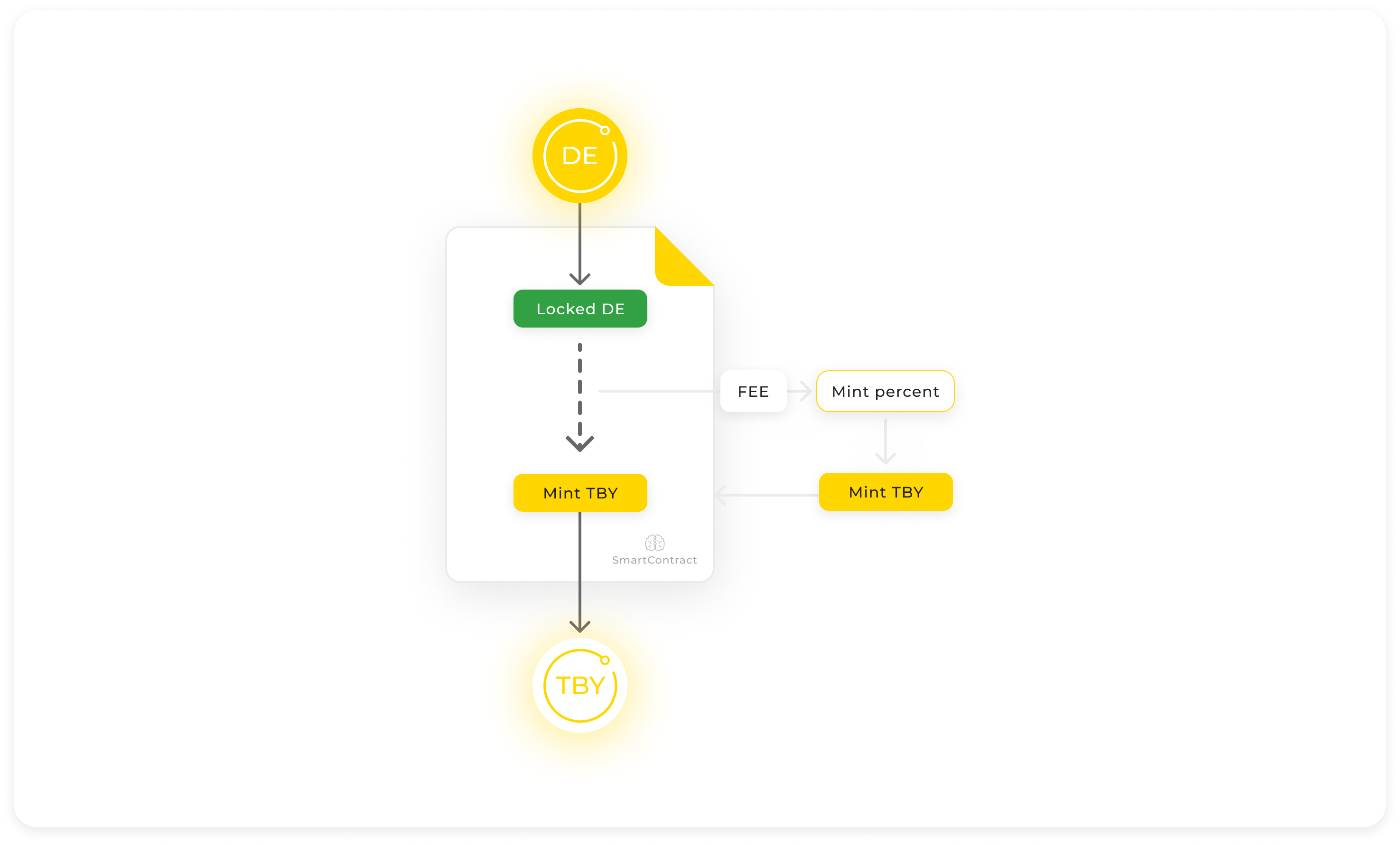
The storage cost is defined as:
P = D/T, where P is the storage cost of the next addition of DE to the contract
- the number of DE put into the smart contract - D
- number of issued TBY by the smart contract - T
The process of issuing TBY is the following:
- When a contract is deployed, the first TBY is issued to correct the initial proportion of DE per TBY defined by the address deploying the smart contract.
- The ecosystem member transfers a certain amount of DE into a smart contract to issue TBY at the offered proportion.
- The smart contract issues the required amount of TBY and sends it to the user's address with the exception of the Pay-in Fee regulated by the Consensus members.
- Pay-in Fee includes the Mint Percent sent to the fee collector and is determined by Consensus participants through on-chain. This parameter is responsible for keeping TBY in the smart contract and affects the future proportion of DE to TBY.
- The smart contract determines the proportion for the next deposit opening TBY and closing TBY_Mined operation.
Each TBY issue transaction always increases the storage cost due to a decrease in the proportion by burning off a part of the commission.
Closing a TBY_Mined deposit
TBY_ Mined is a reward for participants in the DeNet Storage Protocol ecosystem who provide their storage resources (Datakeepers).
Withdrawal of DE from the smart contract is done by the reverse process:
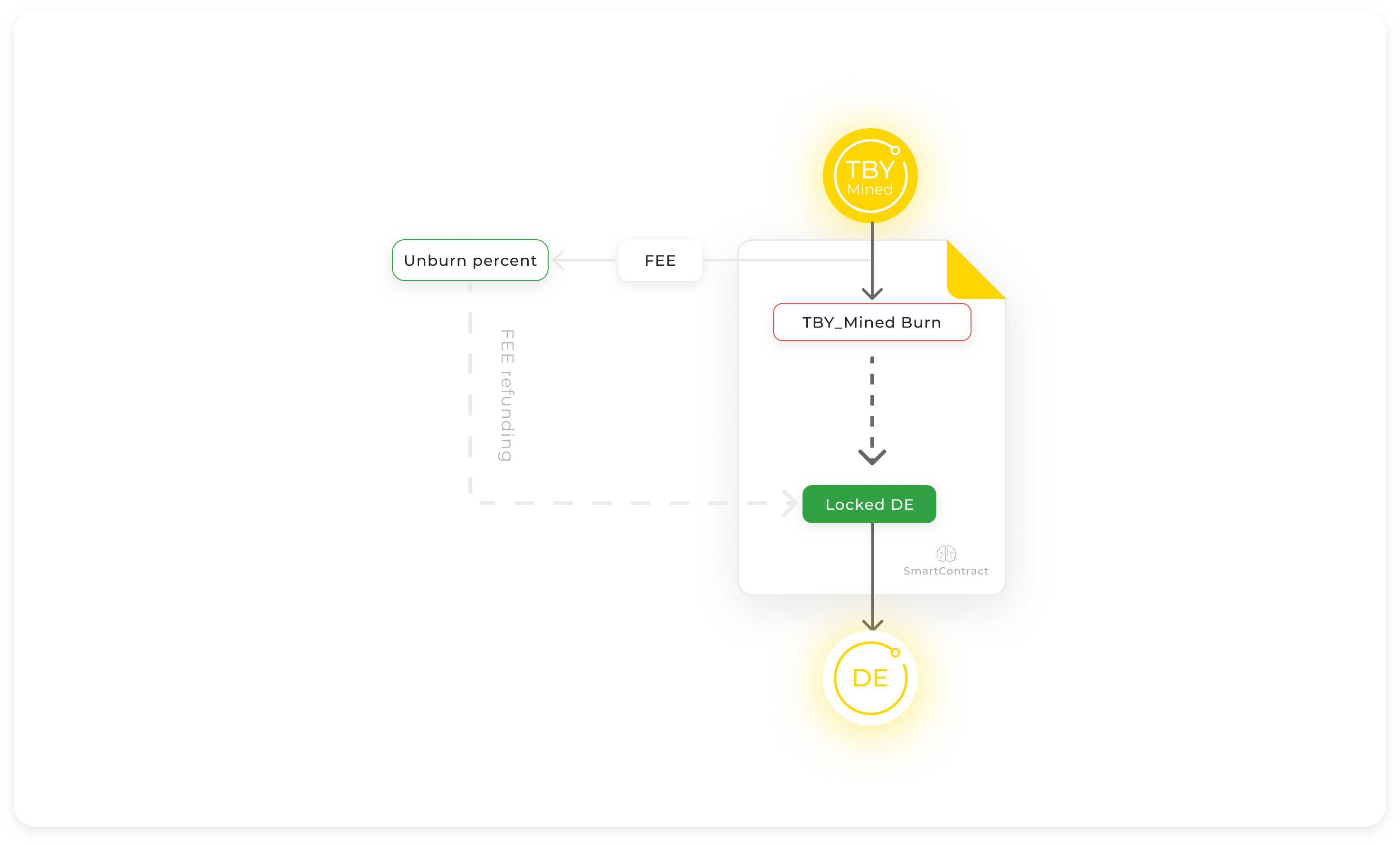
- Datakeeper determines the amount of TBY_Mined to close a deposit at the offered DE to TBY_Mined ratio and transfers TBY_Mined to the smart contract.
- According to the current proportion of DE to TBY_Mined, the smart contract unlocks DE except for the Pay-out Fee regulated by the Consensus members and transfers DE to the Datakeepers' address.
- The transferred amount of TBY_Mined is burned.
- Pay-out fee includes Unburn Percent parameter, which is determined by Consensus participants through on-chain voting. This parameter is responsible for defining the amount of DE returned to the Datakeepers and affects the decrease in the future proportion when opening a deposit.
- The smart contract determines the proportion during the next deposit opening.
Each transaction to unlock DE always decreases the proportion of the next deposit opening because part of TBY Mined, sent to the withdrawal is not burned.
DeNet Consensus
DeNet Consensus is a decentralized governance of DeNet Storage Protocol.
Consensus members, including storage providers and users, have a direct interest in the success of the DeNet Storage Protocol. Their prosperity depends on the protocol's implementation and popularity.
Governance of DeNet Consensus occurs through on-chain real-time voting and off-chain governance, which requires agreement among all Consensus members before implementing a proposal. Governance of DeNet Consensus may change or expand in the future due to subsequent community decisions. All government proposals must lead to the achievement of the DeNet Consensus's goals, and its components must not contradict each other. Otherwise, DIPs may be rejected by DeNet Consensus members.
The main goal of DeNet Consensus is to ensure:
-
The stability and security of the DeNet Storage Protocol.
-
The further development of the DeNet Storage Protocol.
In accordance with this, the areas of DeNet Consensus governance are:
-
Updating dynamic DeNet Storage Protocol settings.
-
Fully updating or the deployment of new smart contracts for the DeNet Storage Protocol.
To participate in the governance of DeNet Consensus, it is necessary to be a holder of veDE governance tokens. To obtain veDE, make a veDE deposit in exchange for DE. The minimum token amount to get veDE = 0.053 DE.
The governance of DeNet Consensus currently takes place at consensus.denet.app. In the future, this website will only allow viewing governance data. Participation in DeNet Consensus will be possible through the DeNet Consensus Voting app on DeNet Market.
Governance Token veDE
veDE is the governance token of the DeNet Storage Protocol's 3rd version (the contract address is 0x6261E1AAc369CD694093455f9e2B65b31AcEdDa1). It can be received by locking DE at a 1:1 ratio when accessing the contract in the app. It is used only for voting for one or another proposal in the DeNet Consensus.
The vote power of is calculated according to the following formula:

TimeFromLastMove - the time of veDE staying at the user's address (but not less than 7 days and not more than 1 year). Any transaction (only opening or closing a deposit is possible) involving this veTB results in a value of 7 days;
N is the amount of veDE left in the account after the last transaction.
Thus, the vote power depends on the duration of the stacking and increases from the moment of your last deposit/withdrawal of the deposit.

In On-chain governance of the DeNet Storage Protocol v.3 there are no limits on the frequency of voting. However, after voting the deposit is locked for 7 days and during this period withdrawal is impossible.
-
You can open and close the deposit at any time, but these actions will reset the accumulated VotePower to a stage of less than 7 days (19 VotePower per 1 veTB). Subsequently, the VotePower accumulation will continue.
-
Whenever governance tokens are moved, all votes submitted during the entire on-chain governance time are nullified.
-
According to the time parameter, the vote power can increase up to a maximum of 1 year. In the next years, if there is no movement of the governance tokens, the vote power is retained.
On-chain Governance
Subject of on-chain governance of the DeNet Storage Protocol v.3
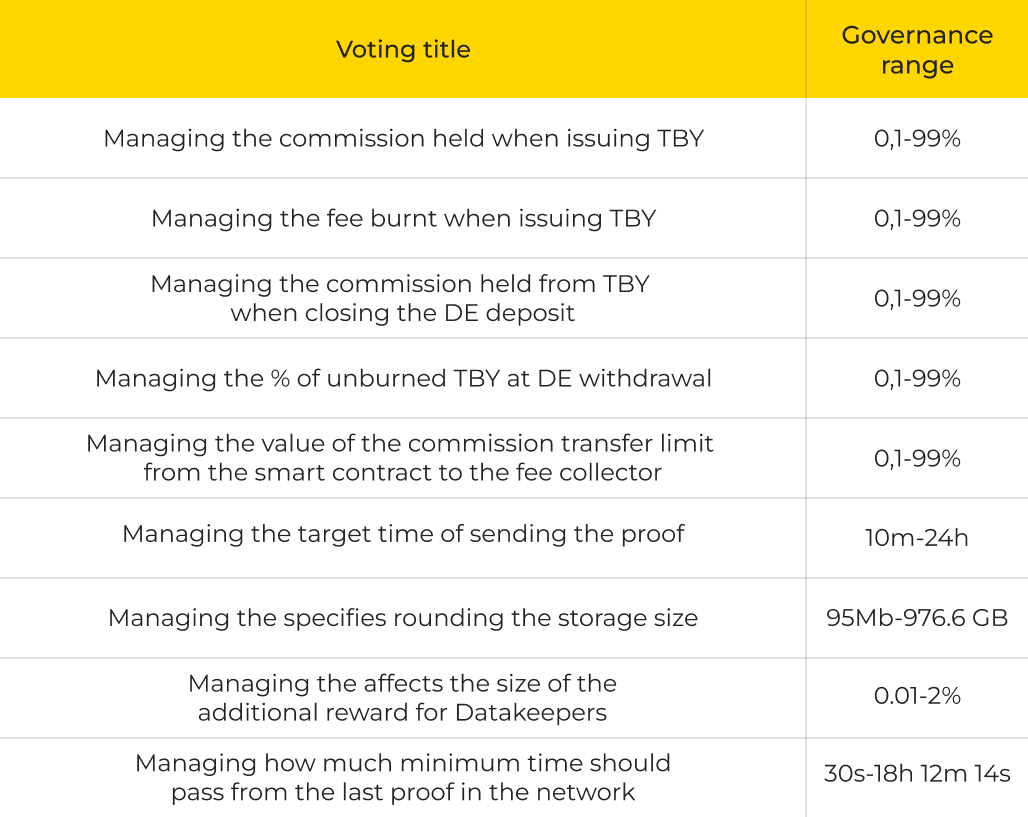
Governance Platform
On-chain governance of the DeNet Storage Protocol v.3 takes place in the DeNet application in a separate DeNet Consensus dApp. Voting is done by sending a transaction addressed to a smart Consensus contract, where the result of the transaction is a change in the key parameters of DeNet Storage Protocol contracts. Voting is instant - at any time a DeNet Consensus participant can make a change to the DeNet Storage Protocol parameters according to their vote power.
Off-chain Governance
Off-chain governance structure of the DeNet Storage Protocol v.3, its smart contracts and settings
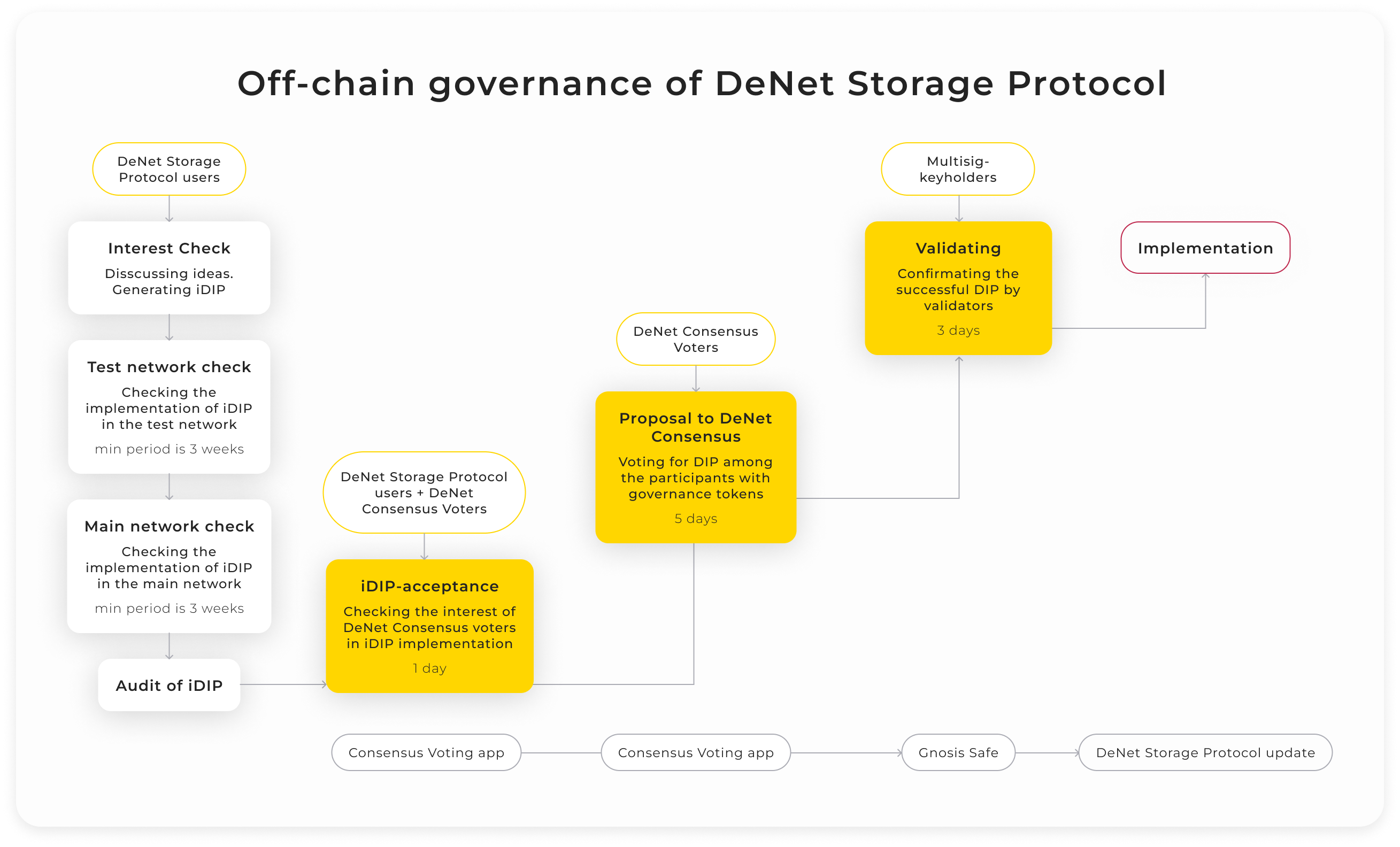
*IDIP - initial DeNet improvement proposal - a proposal being discussed and tested by participants of the data storage network.
*DIP - DeNet improvement proposal - a proposal that is accepted/rejected by DeNet Consensus members with governance tokens.
- IDIP creation stage
Platform: DeNet Discord Server, Consensus category
Government stage:
Generating and discussing ideas for improving the DeNet Storage Protocol. Creating an IDIP and testing its functionality on the test and main networks in accordance with the criteria approved by Consensus members. Passing an audit of the protocol, including the proposed IDIP.
! All IDIPs must correspond to the goals and areas of the DeNet Consensus government.
- IDIP acceptance stage
Platform: consensus.denet.app
Government stage:
Formulation and submission of IDIP by any member of the DeNet community for consideration among the DeNet Consensus members with governance token veDE.
Structure of the proposal:
- Title that captures the essence of the IDIP proposal
- Proposal description:
- Motivation - indicating the problem that the proposal will solve. The motivation must also specify the goal (according to Consensus goals) to which the proposed DIP corresponds.
- Specification - description of a new feature or technical changes.
- Justification - explanation of why this solution is the best for the proposed problem and provides the greatest benefit.
- Assumption regarding the consequences in the security and governance areas.
- Specifying the SC address, transaction code, links to IDIP verification in the test and main networks and to audits.
- Confirmation of functionality - specifying the indicators that were obtained in testnet and mainnet according to the criteria set by the members of the DeNet Consensus.
Within 1 day, DeNet Consensus members must approve/reject the proposed IDIP for further voting.
Quorum - 30% of the total number of DeNet Consensus members must review and like the proposal. Once the quorum is reached for positive reactions, any DeNet Consensus member may submit this IDIP for further voting. In all other cases, the IDIP cannot be submitted for voting and is archived in the IDIP list for six months.
- Voting among DeNet Consensus members based on their voting power
Platform: consensus.denet.app
Governance stage:
For a period of 5 days, members with governance tokens can vote on the implementation of the proposed DIP.
The proposal is considered accepted when the following conditions are met:
- Quorum - 80% of votes calculated based on voting power;
- More than 50% of the total voting power of DeNet Consensus members voted in favor of accepting the DIP.
The total voting power is calculated at the time of creating the DIP.
If the DIP receives a majority of negative votes or does not meet the quorum, it is considered as not accepted and is permanently saved in the "Proposals history" tab.
- DIP confirmation by validators
Platform: https://gnosis-safe.io/
Government stage:
Once the voting has met the quorum and collected a majority of positive votes, any DeNet Consensus member can submit the DIP for validation.
Validators vote "for" or "against" the proposal for a period of 3 days. These individuals have the right to veto if the proposal contains a potential risk or malicious transaction for the development of the DeNet Storage Protocol. The veto is considered imposed if ≤6/8 signatures in the multisig wallet are in favor of accepting the proposal.
- Recording the results
All accepted and rejected DIPs are recorded in the "Proposals history" section of the DeNet Consensus Voting app.
Tracking off-chain governance stages of DeNet Consensus members
For convenient tracking of governance stages within the DeNet Consensus Voting app, the following statuses are introduced:
- NEW - a new IDIP available for consideration among participants with governance tokens;
- Awaiting vote - an IDIP approved by DeNet Consensus members and ready for voting on its acceptance among participants with governance tokens. Any DeNet Consensus member can advance the IDIP to the next stage;
- Consensus Voting - DeNet Consensus in the process of voting for the acceptance of the DIP;
- Validating - in the process of validation for the acceptance of the DIP;
- Accepted - a DIP that has passed the entire DeNet Consensus governance stage and has been accepted for implementation.
- Rejected - a DIP that has been rejected during the governance stage of Consensus.
Criteria approved by the Consensus for passing iDIPs on the DeNet Storage Protocol development in test and main networks
